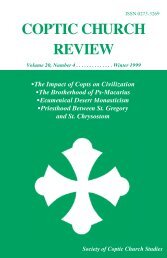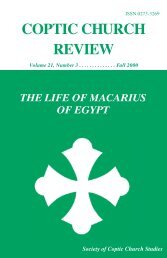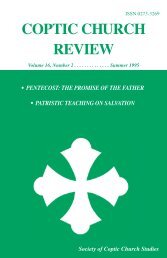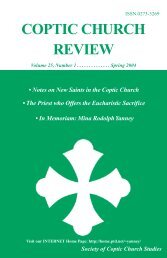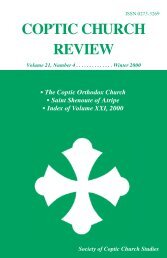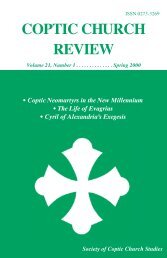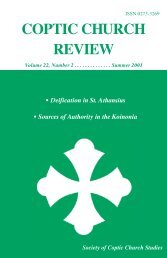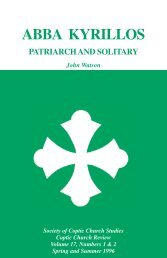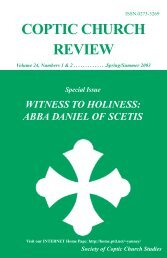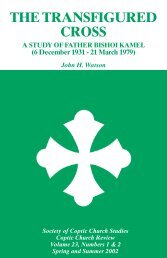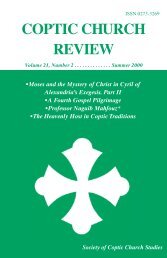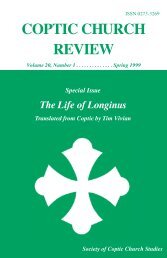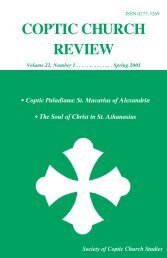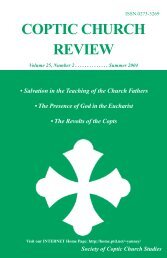2004 Fall.Vol25.#3.pdf - Coptic Church Review
2004 Fall.Vol25.#3.pdf - Coptic Church Review
2004 Fall.Vol25.#3.pdf - Coptic Church Review
You also want an ePaper? Increase the reach of your titles
YUMPU automatically turns print PDFs into web optimized ePapers that Google loves.
78 <strong>Fall</strong> <strong>2004</strong> • <strong>Coptic</strong> <strong>Church</strong> <strong>Review</strong> - Volume 25, Number 3<br />
Witness of the <strong>Church</strong> Fathers in the Second and Third Centuries<br />
The Early <strong>Church</strong> took the words of the Lord as a fact,<br />
without any doubt or argument, even without any attempt at<br />
analysis or at raising any theories to answer the many questions<br />
about how, when, why or any of the other questions that<br />
were raised in the Middle Ages. The reason was very simple.<br />
Numerous heresies appeared in the early centuries that<br />
required responses from the great Fathers of the third, fourth,<br />
and fifth centuries in their sermons, writings and major councils.<br />
Yet there was not a single heresy that denied the Real<br />
Presence of Christ in the Eucharist. Some of the Gnostics<br />
denied the Incarnation itself, saying that God had nothing to<br />
do with matter that is the work of an evil god. As for the<br />
Christian <strong>Church</strong>, the Eucharist was her life; in it Christians<br />
used to meet the Risen Lord. Hence Sunday was called the<br />
Lord’s Day from the first century (Rev 1:10) This is still echoed<br />
in the <strong>Coptic</strong> liturgy every Sunday with the beautiful hymn of<br />
the Offertory that the whole <strong>Church</strong> sings only on Sundays:<br />
“Alleluia, this is the day the Lord has made.”<br />
Early in the second century, St. Ignatius of Antioch writes<br />
in his Epistle to Smyrna, “They [the heretics] abstain from the<br />
Eucharist and from prayer, because they confess not the<br />
Eucharist to be the flesh of our Savior Jesus Christ, who suffered<br />
for our sins, and the Father, of his goodness, raised up<br />
again.” He also writes to the Philadelphians, “Take ye heed,<br />
then, to have but one Eucharist. For there is one flesh of our<br />
Lord Jesus Christ, and one cup to show forth.”<br />
Toward the end of the second century, St. Irenaeus of Lyons writes against the<br />
Gnostic heretics who denied the resurrection of the Body:<br />
He [Christ] has acknowledged the cup (which is a part of the<br />
creation) as his own blood, from which He bedews our blood;<br />
and the bread (also a part of the creation). He has established as<br />
his own body, from which He gives increase to our bodies.<br />
When, therefore, the mingled cup and the manufactured bread<br />
receive the Word of God, and the Eucharist of the blood and the<br />
body of Christ is made, from which things the substance of our<br />
flesh is increased and supported, how can they affirm that the<br />
flesh is incapable of receiving the gift of God, which is life eter-




